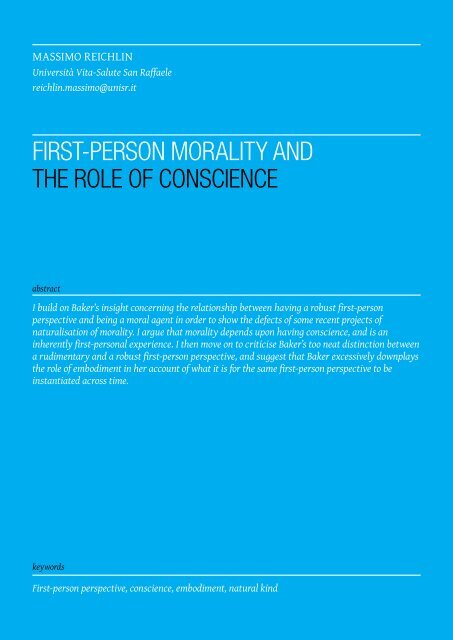A4_PHEN-MIND_n7
A4_PHEN-MIND_n7
A4_PHEN-MIND_n7
You also want an ePaper? Increase the reach of your titles
YUMPU automatically turns print PDFs into web optimized ePapers that Google loves.
Massimo Reichlin<br />
Università Vita-Salute San Raffaele<br />
reichlin.massimo@unisr.it<br />
First-Person Morality and the Role of Conscience<br />
First-Person Morality and<br />
the Role of Conscience<br />
abstract<br />
I build on Baker’s insight concerning the relationship between having a robust first-person<br />
perspective and being a moral agent in order to show the defects of some recent projects of<br />
naturalisation of morality. I argue that morality depends upon having conscience, and is an<br />
inherently first-personal experience. I then move on to criticise Baker’s too neat distinction between<br />
a rudimentary and a robust first-person perspective, and suggest that Baker excessively downplays<br />
the role of embodiment in her account of what it is for the same first-person perspective to be<br />
instantiated across time.<br />
1. In Naturalism and the First-Person Perspective (2013) Lynne Baker convincingly argues that the firstperson<br />
perspective (FPP) is an irreducible element of a complete ontology, and one that cannot be<br />
accounted for in terms of neural processes. I agree with this important conclusion, and with the idea<br />
that the possession of a FPP accounts for many relevant aspects that distinguish the lives of persons<br />
and make them peculiarly valuable and important.<br />
In the first part of this article, building on Baker’s insight, I will stress the peculiar link existing<br />
between moral experience and the FPP: I will suggest that we cannot adequately explain morality<br />
unless we acknowledge the peculiarity of the FPP. In the second part, focusing on human infants’<br />
early capacities for social relations, I will suggest that Baker excessively downplays the role<br />
of embodiment in her characterisation of the FPP, and that her neat distinction between the<br />
rudimentary and the robust FPP might be revised. I will conclude suggesting that Baker’s theory<br />
suffers from a difficulty in the definition of what counts as an instantiation of the same FPP across<br />
time, and that this depends on her view of the relationship between persons and their bodies.<br />
keywords<br />
First-person perspective, conscience, embodiment, natural kind<br />
2.<br />
One central contention in chapter 9 of Naturalism and the First-Person Perspective is that “nothing<br />
can be a moral agent without a robust first-person perspective. Since only persons can have robust<br />
first-person perspectives, only persons can be rational or moral agents” (Baker 2013, pp. 192-193).<br />
This point, I think, is well taken. At the same time, it runs against some recent views coming from<br />
empirical studies of moral judgment. In these studies, it is suggested that morality is a much less<br />
complex phenomenon than we usually think; particularly, that moral judgment is inherently based<br />
on our emotions (Dalgleish 2004), and that all beings showing some form of empathy or possessing a<br />
system of unreflective, automatic emotions (the so called system 1) can roughly be considered moral<br />
agents. Research on the neuroscientific bases of moral judgments, as well as on the psychological<br />
and neuroscientific dimensions of empathy (Moll, de Oliveira-Souza, Zahn & Grafman 2008), have<br />
contributed much to these developments, and to the considerable revival of Humean views on<br />
morality (Nichols 2004 and Prinz 2007). According to these views, moral judgments are nothing more<br />
than gut feelings, or emotional, automatic reactions mediated by our ‘sentimental’ brain (Haidt 2001<br />
and 2007); alternatively, they can be reconstructed as the outcome of a double level of processing by<br />
different areas of our brain, that is, the automatic reactions by system 1, as corrected and integrated<br />
103



